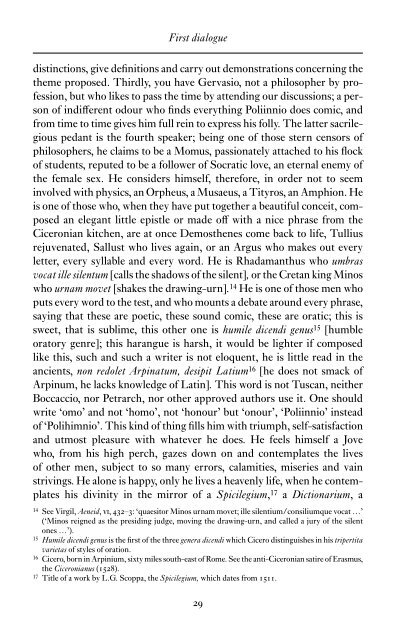Create successful ePaper yourself
Turn your PDF publications into a flip-book with our unique Google optimized e-Paper software.
First dialogue<br />
distinctions, give definitions and carry out demonstrations concerning the<br />
theme proposed. Thirdly, you have Gervasio, not a philosopher by profession,<br />
but who likes to pass the time by attending our discussions; a person<br />
of indifferent odour who finds everything Poliinnio does comic, and<br />
from time to time gives him full rein to express his folly. The latter sacrilegious<br />
pedant is the fourth speaker; being one of those stern censors of<br />
philosophers, he claims to be a Momus, passionately attached to his flock<br />
of students, reputed to be a follower of Socratic love, an eternal enemy of<br />
the female sex. He considers himself, therefore, in order not to seem<br />
involved with physics, an Orpheus, a Musaeus, a Tityros, an Amphion. He<br />
is one of those who, when they have put together a beautiful conceit, composed<br />
an elegant little epistle or made off with a nice phrase from the<br />
Ciceronian kitchen, are at once Demosthenes come back to life, Tullius<br />
rejuvenated, Sallust who lives again, or an Argus who makes out every<br />
letter, every syllable and every word. He is Rhadamanthus who umbras<br />
vocat ille silentum [calls the shadows of the silent], or the Cretan king Minos<br />
who urnam movet [shakes the drawing-urn]. 14 He is one of those men who<br />
puts every word to the test, and who mounts a debate around every phrase,<br />
saying that these are poetic, these sound comic, these are oratic; this is<br />
sweet, that is sublime, this other one is humile dicendi genus 15 [humble<br />
oratory genre]; this harangue is harsh, it would be lighter if composed<br />
like this, such and such a writer is not eloquent, he is little read in the<br />
ancients, non redolet Arpinatum, desipit Latium 16 [he does not smack of<br />
Arpinum, he lacks knowledge of Latin]. This word is not Tuscan, neither<br />
Boccaccio, nor Petrarch, nor other approved authors use it. One should<br />
write ‘omo’ and not ‘homo’, not ‘honour’ but ‘onour’, ‘Poliinnio’ instead<br />
of ‘Polihimnio’. This kind of thing fills him with triumph, self-satisfaction<br />
and utmost pleasure with whatever he does. He feels himself a Jove<br />
who, from his high perch, gazes down on and contemplates the lives<br />
of other men, subject to so many errors, calamities, miseries and vain<br />
strivings. He alone is happy, only he lives a heavenly life, when he contemplates<br />
his divinity in the mirror of a Spicilegium, 17 a Dictionarium, a<br />
14 See Virgil, Aeneid, VI, 432‒3: ‘quaesitor Minos urnam movet; ille silentium/consiliumque vocat …’<br />
(‘Minos reigned as the presiding judge, moving the drawing-urn, and called a jury of the silent<br />
ones …’).<br />
15 Humile dicendi genus is the first of the three genera dicendi which Cicero distinguishes in his tripertita<br />
varietas of styles of oration.<br />
16 Cicero, born in Arpinium, sixty miles south-east of Rome. See the anti-Ciceronian satire of Erasmus,<br />
the Ciceronianus (1528).<br />
17 Title of a work by L.G. Scoppa, the Spicilegium, which dates from 1511.<br />
29

















